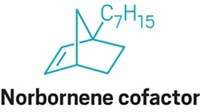Advertisement
Grab your lab coat. Let's get started
Welcome!
Welcome!
Create an account below to get 6 C&EN articles per month, receive newsletters and more - all free.
It seems this is your first time logging in online. Please enter the following information to continue.
As an ACS member you automatically get access to this site. All we need is few more details to create your reading experience.
Not you? Sign in with a different account.
Not you? Sign in with a different account.
ERROR 1
ERROR 1
ERROR 2
ERROR 2
ERROR 2
ERROR 2
ERROR 2
Password and Confirm password must match.
If you have an ACS member number, please enter it here so we can link this account to your membership. (optional)
ERROR 2
ACS values your privacy. By submitting your information, you are gaining access to C&EN and subscribing to our weekly newsletter. We use the information you provide to make your reading experience better, and we will never sell your data to third party members.
Synthesis
SN2 On A Tertiary Carbon
Some tertiary carbons can undergo bimolecular nucleophilic substitutions after all
by Bethany Halford
July 26, 2010
| A version of this story appeared in
Volume 88, Issue 30
Here’s another tenet of organic chemistry that can be crossed out of the textbooks: Tertiary carbons can’t undergo bimolecular nucleophilic substitutions, also known as SN2 reactions. Mark Mascal, Nema Hafezi, and Michael D. Toney of the University of California, Davis, have demonstrated that the tertiary carbons of the oxonium salt 1,4,7-trimethyloxatriquinane are susceptible to SN2 attack by the azide anion (shown in scheme below) (J. Am. Chem. Soc., DOI: 10.1021/ja103880c). Granted, the tertiary alkyl oxonium salt isn’t your typical electrophile. It withstands classic solvolysis conditions, resisting any reaction after several hours in refluxing ethanol. And reaction with basic nucleophiles, such as methoxide, cyanide, and acetate, leads only to elimination reactions. The researchers conclude that because an SN1 reaction route is excluded, the only reasonable mechanistic interpretation for the reaction is the SN2 pathway, even though the substitution occurs at a tertiary carbon. To back up its conclusion, the team studied the reaction’s dynamics and found second-order kinetics. “With the exception of unusual cases in which carbocation formation is electronically disfavored, there are no previous examples to our knowledge of substitution reactions at tertiary alkyl centers that proceed exclusively with second-order kinetics,” the researchers note.






Join the conversation
Contact the reporter
Submit a Letter to the Editor for publication
Engage with us on Twitter